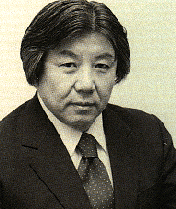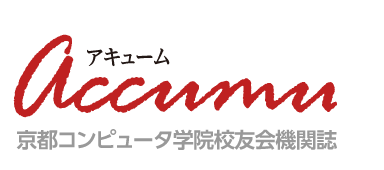Accumu Vol.1
独立独行のひと 初代学院長の思い出
牧野 澄夫

学院創立者・初代学院長
長谷川繁雄
1986年
ハレー彗星の去る歳
明けきらぬ梅雨空
煌々として広がる
7月2日
本学院創立者は
この世を去った
ここに
初代学院長の
偉業を偲ぶ
京都コンピュータ学院初代学院長,故長谷川繁雄先生はself-madeの人であった。文字通り made-by-oneself 自らを教育し,自らを創り上げた人であった。
勿論,学校教育の中で学生が受け取るものは,各自それぞれに異なる。その意味では,教育を受ける学生の方が,自ら選び取ったものだともいえよう。しかし乍ら,日本では特にそうであろうが,学校教育の中では,ややもすると,まさに受動的に先生の話を聞き,偉い先生であるという理由から無条件に受け入れることが多い。いわゆる注入式教育である。これに対し,先生は,断然そのやり方を異にしていたように思われる。先生は,まさしく,人の話を聞いてそれを受け入れるかどうかの判断を行うのは,あくまでも自分自身であるという主義を,生涯を通して貫かれた。
生前,先生から折にふれて,多くの話をお聞きした。ある時には,古代ギリシアの先哲の言葉,ある時には古代中国の荘子の言葉,またある時には仏教経典と,古今東西の先賢の言葉を引用されて,身を乗り出すように話されたのを思い出す。そのお声が今も耳底に残っているが,いつも共通して受ける印象は,そうした言葉が,先生の頭の中で精選され濾過されて,先生の血肉となっていることであった。丁度,美術のコレクターの中に,世評を一切無視して,あくまでも自分の眼だけを信じて独自の美的世界を創り上げた人があるように。あるいはまた,仏教に於て,身命を賭して経典を読み取ることが称揚されるが,丁度そのようにして,先生は本を読まれたのではないかと思われる。
先生は教育とは本来そうしたもの,つまりself-taughtでなければならないと考えておられた。更にself-help即ち自助の精神こそが,教育には最も重要なものであると考えておられた。従って,それを学生にも要求された。教職員にも要求された。過酷なまでに要求された。
また先生は,「官と民」という言葉をよく使われた。先生は,その鋭い,まさに嗅覚の如きもので,官と民の混乱を感じ取られた。先生の考えでは,官と民は水と油の如く,決して交じわらないものであった。判然と区別されるべきものであった。そして,それに関して我が国の現状を批判してやまれなかった。日の本のこのおめでたい国に於ては,民(私)がすぐに官と錯覚する。あるいはすぐに,にじり寄ってゆく。民間にあり乍ら,どこまでも官のまねをする。先生は,官つまり権威,権力に頼る考え方を徹底して否定された。いやそれ以上に,憎悪された。先生は「民間」,「私立」という言葉を愛好された。
先生はよく言われた「事情があって,大学へ行かない子,いやそれ以上に,自覚的に大学へ進まない子を教育するんだ。その子たちを,大学へ進んだものと肩を並べて,それどころか,それ以上の人間にして世の中へ送り出すんだ。京都コンピュータ学院は,そういう子たちが,各自お金を持ち寄って,ここまで創ってきたのだ。これからも,一人一人の学生が,自ら自分の学校を創ってゆかなければならない。私は,その手助けをしているに過ぎないんだ。」と。
先生はユートピアとしての学校を,いつも夢みておられた。今でも思い出す,’69年から始まった大学闘争の中で,京都大学から講師として来校する人たちも,政治信念から,二派,三派に分かれていた。しかし,一歩学院の中へ足を踏み入れたなら,そうした敵対関係は払拭してもらわなければならない。それを要求して,講師の人たちがそれに応えてくれたことを,何度となく,嬉しそうに話された。京都コンピュータ学院は日本の中にあり乍ら,別世界でなければならない。コンピュータという,人類史を変革する可能性を秘めたものに興味をもつ人が,その興味の故に集まっている場所であると。
かくして,先生は,まさに手作りのユニークな学校創造に邁進されたといえよう。ユニーク,即ちこの世界にたった一つしかないもの,先生はそれをこよなく愛された人であった。
先生は,その思想を本の形では残されなかった。残念なことである。しかし乍ら,我々には,先生の残された京都コンピュータ学院そのものが,先生の思想の体現であるように思われる。若き日に,サイバネティクスに大いなる感銘を受けられ,前述の如く,人類史変革の可能性を,いち早くコンピュータに見出された先生にとって,そうして,自助の精神を教育の根幹に思い定められた先生にとって,それはいかにもふさわしいことかもしれない。
Shigeo Hasegawa always dreamed of founding an ideal school, a utopia. He wanted Kyoto School of Computer Science to be a different "world" in Japan and that it should be the hub where those who have a strong interest in computers -- the potential revolutionizers of human history -- can get together in order to realize their goals.
Mr. Hasegawa devoted himself to founding such a unique school of his own vision. For him, this vision was the single, driving force. The late Mr. Hasegawa, founder and first president of KSCS, was self-made and self-educated.
It goes without saying that each student gets something different from education at school. It could be said that the students themselves decide what they get. However, especially in Japan, students listen passively to lectures and tend to accept what they are told without question simply because they are made by prominent professors. This is what is called instilling, or cramming. Mr. Hasegawa though took a different approach in educating youth. He held fast to his principle that it is the students themselves who will judge and decide to accept or reject what they have heard.
During his lifetime, the honored founder gave me chances to learn many things from him. I remember him talking, with his body thrust forward, about the teachings of ancient Greek sages, or about Soshi, the ancient Chinese sage, or at other times quoting from Buddhist Scripture and sages of all ages and countries. I can still hear him speaking to me and it makes me feel that his remarks have indeed become flesh and blood, sorted out and filtered carefully through his mind. It is as if there were someone, among art collectors, who believes in his own eye to judge beauty ignoring all popular judgments to establish his own world. He must have read widely in the same way as Buddhists read the sacred texts.
He held that education should be self-taught. He regarded self-help as the most important aspect of education. He felt strongly enough about this philosophy of education to demand the same from students, faculty and the staff.
Mr. Hasegawa often used the terms "of the government" and "of the people." He sensed the confusion often made between the two with his keenly developed sense. For him government and the people could never mingle together just as oil and water cannot. He conceived that these two should definitely be separated. And, he always criticized the present situation of Japan from this aspect. In this "soft-headed," or conformist society of Japan, the people will easily be confused into thinking that they are the government. Or again, they are ready to side with the government. They will persistently model themselves after the government . Mr. Hasegawa absolutely rejected this way of easily depending on authority. He hated it and even liked to use the words "nongovernmental" and "private."
The founder of KSCS often said, "I want to educate the young people who are not able to enter colleges for whatever reasons and those who do not go to universities of their own will. I want very much to send these young students out to stand abreast with college graduates or with those more educated. It is such young people who paid money to found KSCS. Every one of the students who are now studying here should try his/her best to develop this school as his/her own school. I am only assisting them to fulfil their goal."
Shigeo Hasegawa always dreamed of founding an ideal school, a utopia. I still remember him saying repeatedly with pleasure, "Many professo rs from Kyoto University come to KSCS to lecture and often they are divided among two or three factions due to their political creeds. But, I asked them to forget about such differences when they are on our campus and they willingly agreed to my proposition." He wanted Kyoto School of Computer Science to be a different "world" in Japan and that it should be the hub where those who have a strong interest in computers -- the potential revolutionizers of human history -- can get together in order to realize their goals. In this manner, Mr. Hasegawa devoted himself to founding such a unique school of his own vision. For him, this vision was the single, driving force.
It is very regrettable that the founder did not publish his ideas. However, KSCS itself is to us the embodiment of his ideas. It is very befitting for Mr. Hasegawa, who took great interest in cybernetics in his youth and recognized the potential of computers to revolutionize human history and laid the foundation of education in the spirit of self-help, that this school reflects his ideals.
- 長谷川繁雄初代学院長没後30年
- 初代学院長の思い出
- 初代学院長の思い出
- 初代学院長の思い出
- 初代学院長の思い出
- 初代学院長の思い出
- 初代学院長の思い出
- 初代学院長の思い出
- 初代学院長の思い出
- 初代学院長の思い出 特別編
- 初代学院長の思い出
- 初代学院長の思い出
- 初代学院長の思い出
- 初代学院長の思い出 ―思い出は尽きない
- 初代学院長の思い出
- 初代学院長の思い出
- 初代学院長から伝えられた言葉
- 初代学院長の思い出
- 初代学院長の思い出 京大音研
- 初代学院長の思い出 とこしえの夢 ―前学院長,父との別れ―
- 初代学院長の思い出 よき時代の想い出
- 初代学院長の思い出 真の優しさ
- 若き日の長谷川繁雄初代学院長
- 独立独行のひと 初代学院長の思い出
- 初代学院長の思い出
- 「KCGは京大が生んだ」長谷川繁雄初代学院長先生を偲ぶ閑堂忌



